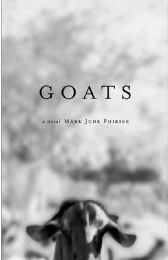GOAT MAN’S GOT it easy: The middle-aged goatherd grows marijuana plants and lives rent-free. He misses Ellis, the 14-year-old co-protagonist of Mark Jude Poirier’s novel Goats, whom he has known since Ellis was a baby. He lives in Ellis’ mother’s Arizona pool house; he smokes a lot of pot.
Goats
by Mark Jude Poirier (Talk Miramax Books, $22)
Ellis’ life is slightly more complex: He leaves the Southwest to attend boarding school in Pennsylvania. During vacations, he visits his divorced parents—an emotionally unstable mother with a tendency to date assholes, and, in Washington, DC, a recently married, emotionally distant father whom Ellis and his mother call “Fucker Frank.” Like most teenagers, he finds himself in the occasional sticky situation—trapped in the backseat of a molesting couple’s car, stoned before the crew coach, stuck inside a Mexican whorehouse. He misses Goat Man. He too smokes pot—when he can find it.
Portland author Poirier compensates for his first novel’s uneventful plot by creating characters with surprising emotional depth. Hindered by insecurity and their inability to express themselves fully, characters communicate through action: Ellis’ father shakes his son’s hand instead of embracing him. Goat Man takes up swimming laps after Ellis’ mother’s athletic boyfriend calls him a slacker. During Ellis and Goat Man’s major spring trek to Mexico, Ellis behaves like a “spoiled brat” once he discovers they’re not delivering an illegal alien into the United States, as his friend had claimed—they’re smuggling coke over the border.
ON A SUPERFICIAL level, the relationship of Ellis and Goat Man consists of dope smoking and conversations about the antics of Ellis’ mother and Goat Man’s goats. On a more profound level, Goat Man serves as Ellis’ best pal and the father he never had. While others view Goat Man as a jobless freeloader, Ellis adopts a more positive—and poignant— interpretation. He supposes that Goat Man’s “obituary would be short: Javier trekked with goats and enjoyed marijuana. [But] Ellis would make sure the obituary . . . said Goat Man was an animal behavior expert . . . a University of Arizona graduate . . . a swimmer . . . a landscape architect . . . a botanist.”
Simple and economical, Poirier’s prose occasionally astonishes the reader with bursts of strange beauty, such as the mountains that “looked like giant brown animals in recline” or the way he describes the drink Ellis’ mother dumps in the pool while fretting over her future relationship with her son—”It was brown and syrupy, and it hung like a squid’s ink in the illuminated water.” For the most part, Poirier’s straightforward narrative maps an even, predictable terrain, like the Arizona desert that figures so prominently. By the novel’s end, however, the reader becomes aware of the emotional churnings beneath that parched surface.








